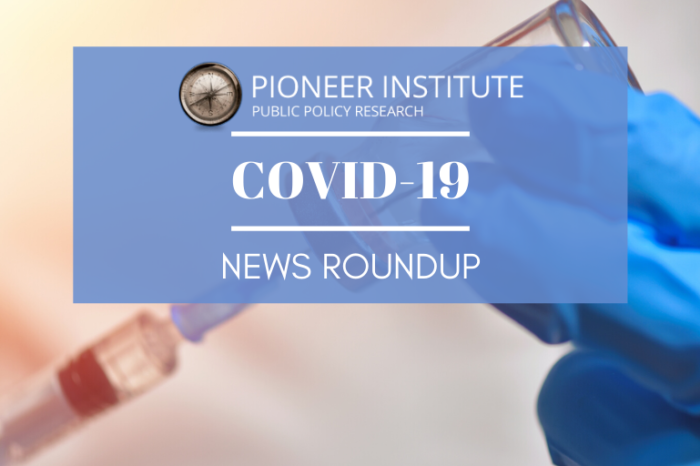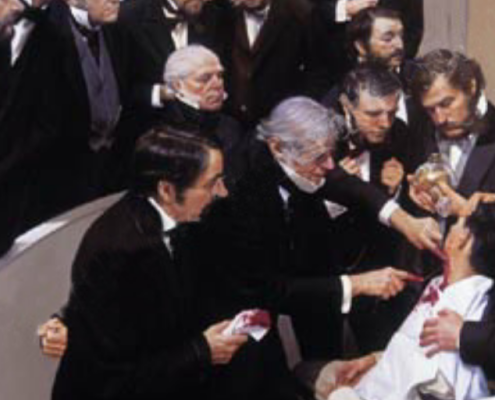COVID-19 Roundup from Pioneer: Hope for a vaccine; Open Meeting violations; Holyoke Soldiers Home report; COVID & foster care; Re-opening the beaches; the fate of college towns; COVID’s economic toll on Bay State cities & more!
Pioneer staff share their top picks for COVID-19 stories highlighting useful resources, best practices, and questions we should be asking our public and private sector leaders. We hope you are staying safe, and we welcome your thoughts; you can always reach out to us via email: pioneer@pioneerinstitute.org.
Our Top Picks for COVID-19 Pandemic News:
William Smith, Visiting Fellow, Life Sciences: Fauci is cautiously optimistic about a vaccine. And, the NIH cancels two trials for hydroxychloroquine for lack of efficacy.
- See Pioneer’s COVID Map (updated weekly) and new COVID Testing Tracker.
Greg Sullivan, Research Director: WHDH-TV aired a segment last night with new revelations about the Holyoke Soliders’ Home and the factors contributing to the tragic COVID death rate. Read Pioneer’s research on the Holyoke Soldiers’ Home. Also, check out Pioneer’s Long Term Care Facility COVID Tracker.
Mary Z. Connaughton, Director of Government Transparency: Pioneer recently lauched a new hotline where the public can log violations of Open Meeting Laws, especially those that may be a result of relaxed standards due to COVID.
Rebekah Paxton, Research Analyst: As town officials and public health experts determine if, when, and how local beaches will reopen, business owners, town managers, and beach-goers alike question what lies ahead. Read our Roger Perry interns’ new analysis on what different towns have done to open their beaches, and view an interactive map of all beach regulations; and an analysis of COVID prevalence and the economic impact on the Cape and islands.
Andrew Mikula, Peters Fellow: Massachusetts is home to so many college campuses – how is COVID affecting them? Read this Associated Press story that cites Pioneer’s research. Also check out my recent policy brief: As college students and parents demand robust COVID-19 response, university finances suffer.
Questions for Our Public & Private Sector Leaders:
Josh Archambault, Senior Fellow: When COVID-19 recedes, child abuse reports and foster care needs are expected to surge. Read my commentary in USA Today this week, co-authored with Naomi Schaefer Riley, on how online services, training and data can strengthen the system.
Joe Selvaggi, Host, Hubwonk: This week, Pioneer Executive Director Jim Stergios and I talked with Boston Globe columnist Jeff Jacoby about his provocative recent column on police reform & public sector unions. Tune in!
- Also: Read Jim Stergios & Pioneer Senior Fellow Charlie Chieppo‘s recent commentary on police reform & qualified immunity in WGBH News and The Lowell Sun.
- See Pioneer’s new “Respect My Rights” hotline for logging civil liberties violations.
Jamie Gass, Pioneer’s Education Policy Director: On the latest episode of “The Learning Curve” podcast, co-hosts Cara Candal and Gerard Robinson talked with Pulitzer Prize winning author Diane McWhorter about Civil Rights history and racial injustice. The hosts also discussed an innovative program used in London to fill learning gaps as a result of COVID school closures, and the migration of New York City’s wealthy families to the suburbs due to COVID – will they return?
- Watch: Digital learning pioneer Julie Young of ASU Prep Digital was the featured speaker at a Pioneer webinar held yesterday, simulcast on Facebook.
Do YOU have interesting questions and/or articles to share with us? Please email us, or message us through our social media channels below!
Share our COVID-19 roundups: bit.ly/PIcovid
Join us on social media!













